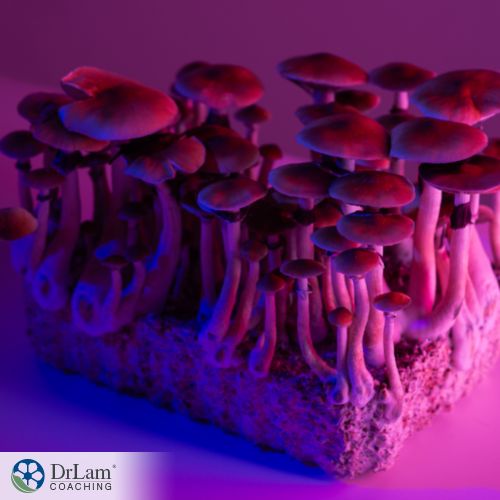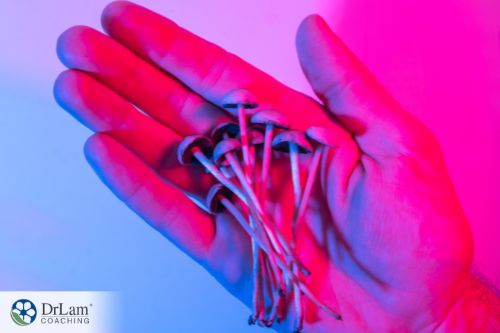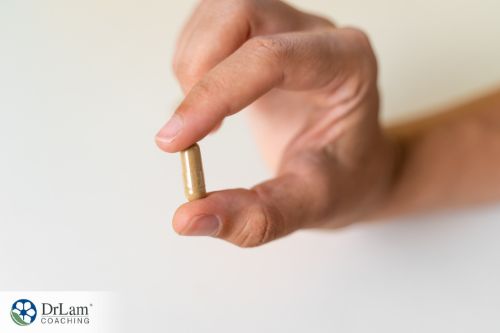 Psychedelics are substances that have a substantial effect on the brain. These drugs are often known as mind-expanding or psychedelics. Many people unfamiliar with psychedelics don't see what they have to offer. Psychedelics for mental health have a strong potential to induce intense states of consciousness, including altered states in perception and spiritual experiences. They are also known for relieving symptoms of various mental illnesses, such as depression, anxiety, and addiction.
Psychedelics are substances that have a substantial effect on the brain. These drugs are often known as mind-expanding or psychedelics. Many people unfamiliar with psychedelics don't see what they have to offer. Psychedelics for mental health have a strong potential to induce intense states of consciousness, including altered states in perception and spiritual experiences. They are also known for relieving symptoms of various mental illnesses, such as depression, anxiety, and addiction.
This article explores psychedelics, the benefits of psychedelic substances, their use as medicine, and their potential risks.
Psychedelics are a class of substances that produce changes in perception, mood, and cognitive processes. They affect all the senses, altering how one thinks or feels. Two types of psychedelics occur naturally and those manufactured in a laboratory. Psychedelic drugs are for people who want to explore their understanding of themselves and reality through the experience of an altered state.
Psychedelics are a class of drugs that induce profound alterations in perception, emotion, cognition, and sense of self. There are three broad categories of hallucinogens: psychedelics, dissociative drugs, and deliriants.
Psychedelics will elicit a sense of awe about the surrounding environment or produce symptoms such as hallucinations and delusions. Examples of drugs include magic mushrooms, LSD (lysergic acid diethylamide), DMT (dimethyltryptamine), mescaline, and ibogaine. These drugs may cause hallucinations or euphoria. They can also induce states that resemble psychosis or dream-like states (dissociative). They can cause nausea or panic attacks (deliriant).
Psychedelic for mental health, like lysergic acid diethylamide (LSD) and psilocybin, are often ingested orally. They are usually taken as a pill or in capsule form. Recreational use of these drugs usually includes “tripping,” where the user may experience hallucinations, altered perceptions, and feelings of euphoria. These substances are also used for spiritual purposes and as medical treatments. Psychedelics can help alleviate depression and anxiety, addiction, and Post-traumatic stress disorder (PTSD) symptoms.
Antidepressants reduce or eliminate suicidal thoughts in people living with terminal illnesses.
Chewing is more popular than smoking them. Both methods release alkaloids in your system quickly and then slow down over time while still producing effects that last longer than other psychedelics such as psilocybin (magic mushroom)s which create intense visuals but only temporary feelings of happiness.
People who use psychedelics do not take them regularly. The most common methods of taking NBOMe are under the tongue, held in the cheek, or snorted. Most forms of NBOMe are inactive if swallowed, and people usually only take it when they have occasion weeks or months apart from each other.
There are many benefits to using psychedelics for mental health. Psychedelics help treat depression, anxiety, addiction, and post-traumatic stress disorder (PTSD). The substances can help people open up about the things that negatively impact their lives and feel more connected with their emotions.
Evidence from several small studies suggests these drugs can be safely administered and may benefit people with intractable depression and other psychological problems like PTSD. psychedelic-assisted psychotherapy could provide needed options for debilitating mental illnesses, major depressive disorder, alcohol use disorder, and anorexia nervosa. These disorders kill thousands every year in the US alone and cost billions worldwide because of lost productivity.
One study published in November 2020 found that 71% of people with major depressive disorder who gave a single dose of psilocybin experienced a 50% significant reduction in symptoms of depression after four weeks. Some patients even experienced complete remission from their depressive symptoms. Another study found that 80% of participants given lysergic acid diethylamide (LSD) reported experiencing lasting benefits such as improved mood and reduced anxiety.
 Psychedelics for mental health are types of drugs that affect the brain. They can alter how someone perceives the world and their mind. Psychedelics can also trigger feelings of spiritual enlightenment. The most popular psychedelics are LSD, psilocybin (i.e., magic mushrooms), mescaline, and dimethyltryptamine (DMT). Humans have used these substances for centuries to induce desired effects.
Psychedelics for mental health are types of drugs that affect the brain. They can alter how someone perceives the world and their mind. Psychedelics can also trigger feelings of spiritual enlightenment. The most popular psychedelics are LSD, psilocybin (i.e., magic mushrooms), mescaline, and dimethyltryptamine (DMT). Humans have used these substances for centuries to induce desired effects.
Most psychedelics work by attaching themselves to specific receptors in the brain called 5-HT2A receptors. These receptors are present in many areas of the brain. While these receptors do not exist in large numbers in the cortex region, they occur within a vital area called “the default mode network.” It is responsible for our sense of self and our ability to objectify thoughts and feelings.
Researchers have been investigating the biological effects of psychedelics for over twenty years, including with positron emission tomography before and after volunteers use the drugs. The studies show how the brain responds to psychedelics such as psilocybin, LSD, and ayahuasca; they act on serotonin receptors.
Serotonin is an important neurotransmitter and targets two types of drugs: antidepressants, which work by increasing serotonin levels in your brain, and psilocybin. There's some evidence that psychedelics might enhance neuroplasticity, the ability for neurons to forge new connections - in animals. Still, there's no clear understanding of how it would work with humans.
The research suggests that the best way to achieve a biological effect is by doing it together with guidance from medical practitioners.
According to France, the drugs "activate" a therapeutic, dreamlike state that intensifies sensory perception and allows memories to pop up like little films.
The enteric nervous system (ENS) can't do your accounting or compose a love letter, but its primary role is controlling digestion. It helps with swallowing, breaking down food, and concentrating on blood flow to the stomach that assists in nutrient absorption; it also aids in emptying our bowels. The ENS doesn't seem capable of thought as we know it, yet some researchers say this central control may trigger significant emotional shifts experienced by people with irritable bowel syndrome (IBS).
According to Pasricha, new evidence suggests an association between gastrointestinal irritation and mood changes. For decades, medical practitioners have relied on knowledge about IBS's links to psychological stressors like anxiety or depression for diagnosis and treatment approaches for patients who suffer from these gut problems like constipation, diarrhea, or bloating pain due to issues such as cramping/stomach upset.
The brain affects the stomach and intestines. Your gut can be in knots because of anxiety, stress, or depression; it can cause or produce these conditions. Given the intimate connection between the brain and gastrointestinal system, it is not surprising. For example, when there is no apparent physical cause for a person's gastrointestinal upset, it makes sense to consider how stress and emotions might be playing into things.
In cases where people are experiencing GI distress from functional disorders, that is to say, with an emotional component. It can be difficult to heal their gut without considering these possible factors at play. Antidepressants are not always for irritable bowel syndrome, but they may give when a patient's symptoms are under control by nerve cells in the gut. Discover the effects on metabolism that signals from the digestive system have and understand how interactions between nerve cell signals, gut hormones, and bacteria in our stomach affect it.
 Psychedelics for mental health are a class of drugs that produce hallucinations and altered states of consciousness. In addition to recreational use, these drugs have a long history of religious and spiritual ceremonies. Psychedelics can be natural or synthetic, and they include LSD, psilocybin, DMT, and MDMA.
Psychedelics for mental health are a class of drugs that produce hallucinations and altered states of consciousness. In addition to recreational use, these drugs have a long history of religious and spiritual ceremonies. Psychedelics can be natural or synthetic, and they include LSD, psilocybin, DMT, and MDMA.
Psychedelics for mental health are the most dangerous drugs because they can cause severe psychological distress and high abuse potential. The risks of using psychedelics include:
Adrenal Fatigue Syndrome is a condition where the adrenal glands cannot produce enough of the hormone cortisol. Symptoms of this include fatigue, headaches, sleep deprivation, and depression. One effect that psychedelics have on the body is that they stimulate hormones in the brain, serotonin. It can be a medical benefit for people who suffer from AFS because it boosts their production of these hormones.
A lack of certain neurotransmitters and increased inflammation due to changes to your microbiome are risks. It negatively impacts a system already weakened by either one or more conditions.
When there is a decreased level of serotonin, its deficiency causes depression and anxiety levels.
Psychedelics for mental health are not addictive like other drugs, which do not cause withdrawal symptoms when a person stops taking them. The use of psychedelics does not need to be a daily practice. Research on psilocybin, a psychedelic substance found in certain mushrooms, has shown promising results for treating depression and anxiety disorders. It is beneficial for anyone suffering from AFS because it can make them feel more energized, less tired, and refreshed.
It's no secret that we all want a happy, healthy body. The body has a natural stress response system to keep us in good health when we are under stress. The NeuroEndoMetabolic (NEM) Stress Response comprises six interconnected biological circuits containing three organ systems that work together as needed and affect one another if they become dysfunctional.
The Neuroaffect Circuit consists of the brain, autonomic nervous system, and microbiome. These three organs work together to positively or negatively impact one another.
Stress causes the activation of your ANS, which comprises epinephrine and norepinephrine. When stress levels increase, they will release these substances to help you deal with it. It can lead to an increased heart rate or sleeplessness as a result.
However, because this procedure is still experimental and not yet proven, there should be extreme caution taken when trying this out on one's own.
Psychedelics are substances that have a substantial effect on the brain. They are known for their ability to induce intense states of consciousness, including altered states of perception, spiritual experiences, and profound emotional alterations. People are well-known for their ability to generate severe states of consciousness, including altered states of perception, spiritual experiences, and profound dynamic alterations. Psychedelics for mental health have enabled many people to overcome mental barriers that they otherwise would not have been able to address.
 Psychedelics are promising sources of medicine, and people should not be dismissive of their medicinal value. Appropriate use of psychedelics often results in profound healing experiences.
Psychedelics are promising sources of medicine, and people should not be dismissive of their medicinal value. Appropriate use of psychedelics often results in profound healing experiences.
Please do your best to take a course of action with the guidance of your healthcare practitioner, who will assess the supplements' benefits for you and recommend an appropriate dosage.
The team at Dr. Lam Coaching can help if you are looking for more information on adrenal fatigue syndrome and the NeuroEndoMetabolic stress response and neuroaffect circuit. We offer a free** no-obligation phone consultation which will discuss your symptoms privately over the phone at +1 (626) 571-1234 or through our Ask The Doctor system.
You should consult a medical practitioner who prescribes psychedelics for mental health for proper dosage. You can use it to treat various mental health issues, including anxiety, depression, and PTSD. Psychedelics were influential in treating mental health issues when used as prescribed by a medical professional.
